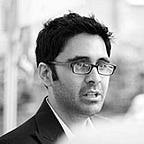If The World is Ending, What’s Beginning?
The Future of Global Politics
You might be forgiven for asking, taking a glance around: is this the end of the world?
Yes and no. The changes sweeping the globe are much more dramatic and intense than most think. And yet life will go on.
The real question is: what is this the beginning of? After all, every ending contains a beginning.
I think there is a new spectrum emerging in global political economy. To illustrate, let’s begin with what’s ending.
This is the end of a kind of political economy. It’s the end of conservatism as we know it. And the end of liberalism as we know it. It’s therefore also the end of a global order built on a carefully balanced ideal of that liberalism against that conservatism.
Because it’s the end of that global order, it’s also the end of the social contract it wrote. One which essentially privatised most public goods, publicised most private risks and debts, and funnelled profits upwards.
That wasn’t the way this order was supposed to work. It was explicitly designed for shared prosperity, for surpluses not to pile up at the top, by Keynes. But because of spectacular mismanagement by a generation of failed and captured elites, the system broke.
What will it be replaced with? A new tension in global politics, a new left and right. In this sense, the world is ending.
The first thing that’s beginning as the world is ending is something old that’s new again: National Socialism. It is already beginning to replace yesterday’s technocratic libertarian conservatism on the right. You can see the seeds of national socialism in the new wave of authoritarian leaders from the us to France to the UK to Turkey.
National Socialism is effectively a way to divide up a shrinking pie of prosperity. When it shrinks, the slices must be rationed. They can’t be happily shared, fairly traded, anymore. So now there’s a division of society into the worthy and unworthy, the true and false citizen, the lesser and superior human being.
All this is just rhetoric. But with a point: to create a moral justification for rationing the social product. It is the superior who deserve education, healthcare, transport, and so on, by virtue of their God-given supremacy.
The other end of the new spectrum of politics I’ll call New Humanism. New Humanism, in stark contrast to New National Socialism asserts the human potential of everyone. So unlike neoliberalism, it isn’t focused on GDP, but the growth of real standards of living. It invests in public goods to drive real human progress, especially for the average person, not just the fortunate few, forwards.
If the rising wave of authoritarians are examples of New National Socialism, who’s an example of New Humanism? Scandinavian social democracy, Icelandic reformism, Trudeau’s Canada.
No, none of these are perfect. They’re just beginnings. We’re not making moral judgments, just observing.
The difference is that New Humanists are committed to expanding the pie of human potential, whereas their opponents, New National Socialists, are most devoted to more savage ways to divide it up. That’s the great divide between them – and among us.
Umair
London
July 2016
